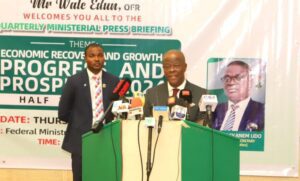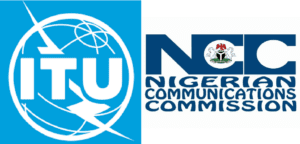
10th NASS Leadership: Akpabio ignores APC NWC, names Senate Committee Chairmen
…As VP Shettima meets behind closed-doors with Abass, others
By Moses Adeniyi
Despite the decision of the All Progressives Congress National Working Council to come up with a unanimous decision on the composition of the 10th Nigerian National Assembly composition, in a daring move, the President of the Senate, Senator Godswill Akpabio has announced Chairmen for Special Committees in the 10th Senate.
In line with the Standing Orders 2022 as amended, the Senate President named members into the Selection Committee on Tuesday.
The composition as he declared, has him as the Chairman with the Deputy Senate President, Senator Jibrin Barau as the Vice chairman and other principal officers of both majority and minority extraction.
Members of the Selection Committee are Senator Opeyemi Bamidele (APC, Ekiti Central), the Senate Majority leader; Senator Ali Ndume (APC, Borno), the Senate Chief Whip; Senator Dave Umahi (APC, Ebonyi South), the Deputy Leader and Senator Lola Ashiru (APC, Kwara South), the Deputy Whip.
Other members are Senator Simon Davou Mwadkwon (PDP, Plateau North), the Senate-Minority Leader; Senator Darlington Nwokocha (LP, Abia Central), the Minority Whip; Senator Oyewumi Kamorudeen Olarere, (PDP Osun West), the Deputy Minority Leader and Senator Rufai Hanga (NNPP, Kano Central), the Deputy Minority Whip.
Akpabio also named the Chairmen and Deputy Chairmen of the other Special Committees of the Senate. Among the Chairmen are Senator Tutus Zam, APC, Benue North West; Senator Sunday Karimi, APC, Kogi West; Senator Okechukwu Ezea, LP, Enugu East; Senator Aliyu Ahmed Wadada, SDP, Nasarawa West, and Senator Shehu Umar, APC, Bauchi South.
Also named were Senator Garba Maidoki, PDP, Kebbi South; Senator Adeyemi Adaramodu, APC, Ekiti South and Senator Olamilekan Adeola, APC, Ogun West.
According to the portfolio, Senator Titus Zam was named as the Chairman Senate Committee on Rules and Business with Senator Opeyemi Bamidele as vice chairman, while Senator Sunday Karimi was appointed Chairman, Committee on Senate Services with Senator Williams Jonah as vice Chairman.
Others are Senate Committee on Ethics, Privileges and Public Petitions with Senator Okechukwu Ezea as Chairman and Khalid Mustapha as Vice Chairman.
Senator Ahmed Wadada was named as Chairman of the Senate Committee on Public Accounts and Senator Onyeka Peter Nwebonyi as Vice Chairman.
Committee on National Security and Intelligence has Senator Shehu Umar as Chairman with Senator Asuquo Ekpenyong as Vice Chairman.
In addition, the Senate Committee on Legislative Compliance has Senator Garba Musa Maidoki as Chairman and Senator Ede Dafinone as Vice Chairman.
The Senate Committee on Media and Public Affairs has Senator Adaramodu Adeyemi Raphael as Chairman and Senator Salisu Shuaibu Afolabi as Vice Chairman.
Akpabio added that in accordance with Senate Standing Orders 95(b) as amended, under sundry matters and in anticipation of the possibility of receiving the Supplementary Appropriation Bill, the Selection Committee has also resolved to set up a committee on Appropriations.
He named Senator Solomon Adeola as the Chairman of the Senate Committee on Appropriations and Senator Ali Ndume as Vice Chairman.
The development, however, NewsDirect gathered further angered the leadership of political parties, particularly of the ruling APC which had earlier expressed discontentment over the selection of principal officers earlier announced last week by President of the Senate, Godswill Akpabio and Speaker of the House of Representatives, Tajudeen Abbas.
Recall that last week, speaking after his selection as announced by Akpabio, the Senate leader, Opeyemi Bamidele, had said his emergence was not a matter to be determined by the political party but a resolution of members of six minority parties in the National Assembly.
Addressing journalists in Abuja, Senator Bamidele had said the Senate would constitute special and standing committees before the end of the month.
He had said, “For us, the next task is to ensure we hit the ground running so that we are able to take steps to show that we have a clear understanding of what is to be done.
“The first task ahead of us is to constitute special committees of the 10th Senate. Our rules make provision for six special committees.
“This is so that every senator can get busy, based on their own professional background and can properly fit into the sector where they can add value.
“We are ready to attend to correspondence from the executive. Through the Committee of the Whole of the House, we will commence with the confirmation hearing of service chiefs and some other appointees who had been named by the President.
“By the grace of God, we will be able to make a difference that will be positive, that will be worth the effort of all of you that worked with us in ensuring that the two presiding officers emerged in a manner that was not rancorous. But, of course, the emergence of the remaining principal officers of the 10th Senate was not an issue that was meant to be decided on the floor.
“Rather, it was an issue which on the one hand as related to the All Progressives Part, (APC), needed to be decided among the critical stakeholders of the party. This was what led to the emergence of the officers.
“On the other hand, with respect to the minority parties, again it wasn’t entirely a party affair because it wasn’t a typical situation where you have one opposition party but rather six political parties were involved.
“Fifty of our colleagues were involved. So rather than it being a decision to be taken at the secretariat of political parties, it was more of a decision taken by members who were elected on the platform of the six minority parties.
“Thirty-eight of them by virtue of their signature took a decision as to who their leaders will be and, of course, this was also communicated to their respective political parties and as democrats, all the presiding officers did was to follow suit because more than a single majority had decided.”
Meanwhile, as discontentment grows regarding the composition of the leadership of the 10th NASS, the Vice President Kashim Shettima met behind closed doors with principal officers of the National Assembly, led by the Speaker, Hon. Abass, at the Presidential Villa, Abuja on Tuesday.
Also, present at the closed-door meeting were ranking members of the House of Representatives, including the Deputy Speaker, Hon. Benjamin Kalu.
The meeting constituted the first the leadership of the House had with the number two citizen, since their emergence as Speaker and Deputy Speaker respectively.
Recall that the announcement of principal officers of both chambers of the NASS as endorsed by Akpabio and Abbas had last week generated controversies as the Senator Abdullahi Adamu-led National Working Committee (NWC) of the All Progressives Congress (APC) had distanced itself from the selection, a development that showed both sides were now in tussle.
Both Akpabio and Abbas are products of consensus candidates of the ruling party, but their choice of other principal officers of the chambers appeared to have defied the endorsement of the party leadership.
Last week, the Senate President and the Speaker had, after a closed-door meeting with members, came up with other principal officers by consensus for the two chambers respectively.
While Akpabio picked Opeyemi Bamidele, Dave Umahi, Ali Ndume and Lola Ashiru as Majority Leader, Deputy Majority Leader, Chief Whip and Deputy Chief Whip in the Senate respectively, Abbas announced Julius Ihonvbere and Kingsley Chinda as Majority Leader and Minority Leader respectively in the House of Representatives.
The selection both represented the APC and the opposition Peoples Democratic Party (PDP).
The PDP, Labour Party (LP) and New Nigerian Peoples Party (NNPP) shared other minority positions in the House of Representatives.
Discontented with the development, the Senator Abdullahi Adamu-led NWC of the APC, immediately disowned the leadership positions announced by Akpabio and Abbas.
The party leadership held that the party had not officially communicated with both presiding officers, distancing itself from the selection.
The National Chairman of APC, Adamu disowned the leadership of the National Assembly, as governors elected on the platform of the party pledged their loyalty to the party leadership.
Adamu at a meeting with the Progressive Governors’ Forum (PGF), led by Senator Hope Uzodinma of Imo State, which had members of the NWC in attendance in Abuja last week, said it is the party’s responsibility to communicate such decisions to the Assembly leadership, saying the NWC under him will not break away from the tradition.
“The essence of today’s invitation is simply to rub minds with you as a matter of courtesy. You will get an update on the National Assembly, sharing of powers, particularly the leadership of the chambers.
“The election of the Senate President and Deputy Senate President, the election of the Speaker and the Deputy Speaker of the House of Representatives have been determined and they have now assumed their responsibilities.
“The remaining offices at the two chambers is yet to be done. I had a courtesy call on Saturday from the President of the Senate and his deputy. The following day which was Sunday, I received a visit from the Speaker and his deputy coming to me for Sallah’s homage.
“But I am just hearing rumours now from the online media that there have been some announcements in the Senate and House of Representatives. The national headquarters of the party or the NWC has not given any such information or communicated about the choice of the remaining offices and until we formally resolve and communicate to them in writing which is the normal practice as had been done before we came here, it is not our intention to break away from tradition.
“So, whatever announcement is done either by the President of the Senate, Deputy Senate President, Speaker or Deputy Speaker, is not from this secretariat.
“We are going to formally inform you that we are going to have a caucus. For quite some time, there has been no caucus in place. The caucus has been reconstituted according to the constitution of APC and we will be discussing that with you.
“As Governors, you know your States more than we know it. Even if we come from the same State, the leadership is with you as governors. We will hear your advice and then see how we can ensure that we are in complete compliance with the provisions of the constitution of the party.
“We hope we will be receiving some reports from the Progressive Governors Forum chairman or his representative, to get to know your thinking, your feelings on what to do to improve the chances of the party and, therefore, reduce the problems and bickerings we have been hearing from time to time.
“Along with the caucus, the National Advisory Council, we will give you the list that has been prepared and make sure every State is represented and we will give you the knowledge of it before the date so that if there is any advice, you will give us before the date.
“You will also be given the details of the audit of accounts from April 2022 to April 2023. The Presidential Campaign Council, PCC, the account has been audited and it has been submitted to the Independent National Electoral Commission, INEC, by the party,” Adamu had said.
In response at the meeting, Uzodimma who spoke on behalf of the governors had said, “We are loyal to the party completely, and we assure the leadership of the party that all the Governors here are constructive partners in the job of building our party and are willing to work with the party and submit to the ideas and norms of the party.
“We don’t have another party. This party is the largest party in black and white Africa, and we will have to run with it.”
On Adamu’s position on the principal officers of the NASS, Uzodinma said, “Chairman never said they are on their own. The National Assembly leadership belongs to our great party and they are members of our party and they enjoy our support.
“If there is any way there is a communication gap anywhere, we will make it up and we have our internal mechanism of resolving such things. The National Assembly leadership enjoys the support of the Progressive Governors’ Forum and that of our party. We don’t have any problem at all.”
Akpabio last week announced Senator Opeyemi Bamidele (APC, Ekiti Central), as the Senate majority leader and former Senate Leader, Senator Ali Ndume (APC, Borno South), as the Senate Chief Whip.
Reading a letter from the APC, caucus, Akpabio also announced Senator Dave Umahi (APC, Ebonyi South), as the deputy leader and Senator Lola Ashiru (APC, Kwara South), as the deputy whip.
Akpabio had said, “The All Progressives Congress, APC, caucus of the Senate after consultations, has emerged with their leadership which will be the fulcrum of commencing other businesses of the chamber.”
He also announced Senator Simon Davou Mwadkwon (PDP, Plateau North), as the Senate Minority Leader and Senator Darlington Nwokocha (LP, Abia Central), as Minority Whip.
Akpabio also read the names of Senator Oyewumi Kamorudeen Olarere (PDP, Osun West), as Deputy Minority Leader and Senator Rufai Hanga (NNPP, Kano Central), as Deputy Minority Whip.
On his part, the Speaker, Tajudeen Abbas, last week announced Julius Ihonvbere, representing the Owan Federal Constituency of Edo State as the majority leader, and Kingsley Chinda, who represents Ohio/Akpor Federal Constituency of Rivers State as the minority leader.
Other principal officers from the majority caucus as announced by Abbas were Abdullahi Ibrahim Halims (Kogi, APC), the deputy majority leader; Usman Bello Kumo (Gombe, APC), chief whip and Adewumi Onanuga (Ogun, APC), deputy majority whip.
In addition, Kingsley Chinda was picked as minority leader; Ali Isa JC (Gombe, PDP) minority whip; Ali Madaki (Kano, NNPP) deputy minority leader; and George Ozodinobi (Anambra, LP) deputy minority whip.



